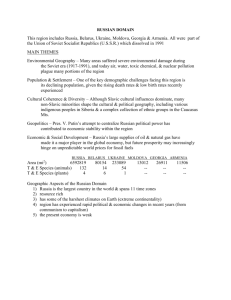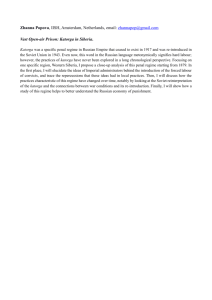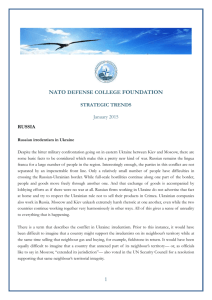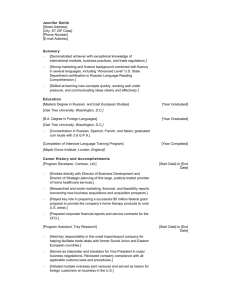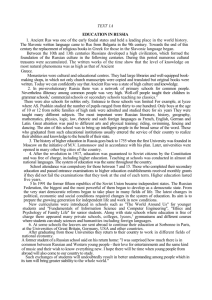The Difficulty of Translating Russian Educational Terminology into
advertisement
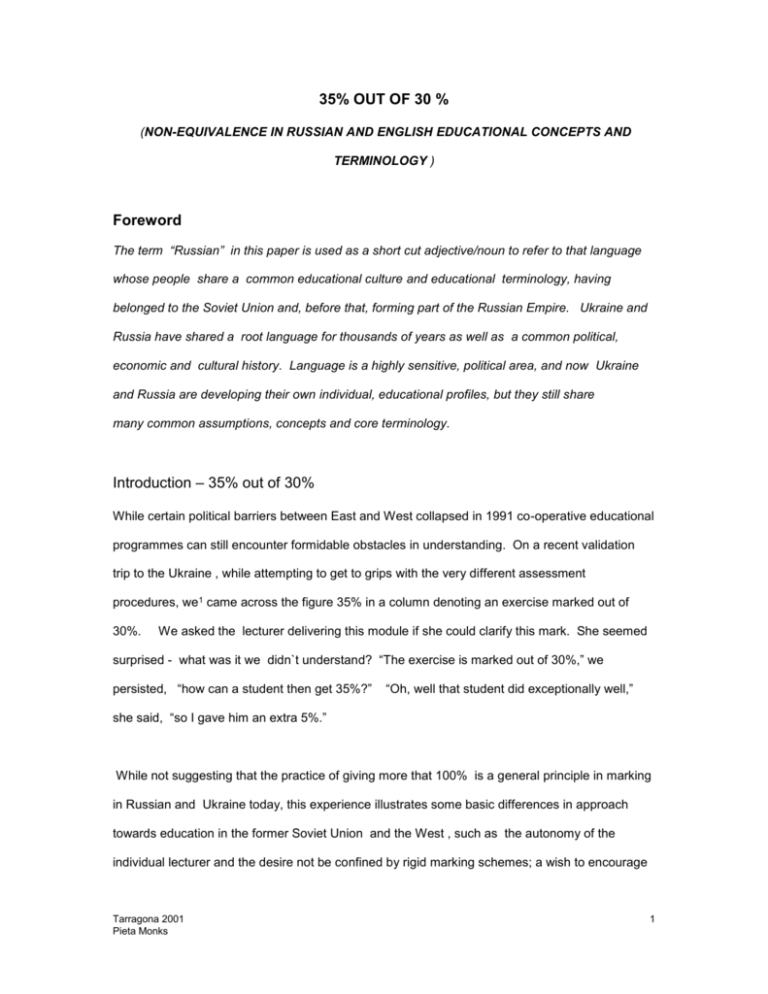
35% OUT OF 30 % (NON-EQUIVALENCE IN RUSSIAN AND ENGLISH EDUCATIONAL CONCEPTS AND TERMINOLOGY ) Foreword The term “Russian” in this paper is used as a short cut adjective/noun to refer to that language whose people share a common educational culture and educational terminology, having belonged to the Soviet Union and, before that, forming part of the Russian Empire. Ukraine and Russia have shared a root language for thousands of years as well as a common political, economic and cultural history. Language is a highly sensitive, political area, and now Ukraine and Russia are developing their own individual, educational profiles, but they still share many common assumptions, concepts and core terminology. Introduction – 35% out of 30% While certain political barriers between East and West collapsed in 1991 co-operative educational programmes can still encounter formidable obstacles in understanding. On a recent validation trip to the Ukraine , while attempting to get to grips with the very different assessment procedures, we1 came across the figure 35% in a column denoting an exercise marked out of 30%. We asked the lecturer delivering this module if she could clarify this mark. She seemed surprised - what was it we didn`t understand? “The exercise is marked out of 30%,” we persisted, “how can a student then get 35%?” “Oh, well that student did exceptionally well,” she said, “so I gave him an extra 5%.” While not suggesting that the practice of giving more that 100% is a general principle in marking in Russian and Ukraine today, this experience illustrates some basic differences in approach towards education in the former Soviet Union and the West , such as the autonomy of the individual lecturer and the desire not be confined by rigid marking schemes; a wish to encourage Tarragona 2001 Pieta Monks 1 students, and the self-confidence to exceed normal marking limits. From the method and form of assessment we can deduce a particular approach to and concept of education as a whole. 2 Context of Research The context of our validation trip to the Ukraine was the mushrooming of educational partnerships between former Soviet states and Great Britain Since 1991. With the opening up of the former USSR and the possibility of more exchange of information and ideas these partnerships have eagerly been sought by both sides for many reasons; the UK for increased prestige and greater research possibilities, as well as money flowing in from consultancy fees and other services. The East also seeks the prestige of joint home and Western diplomas; it needs the know-how and technical aid the West can offer, and highly values placement opportunities for its students. In the wake of scandals in Asia and China, however, UK universities are now being very careful about checking the quality of courses that they validate abroad, adhering rigorously to the guidelines of the UK Quality Assurance Agency. But there is often a great deal of difficulty in adhering to guidelines when validating a foreign course where there is no measurable structural/linguistic educational comparability. Giving 35% out of 30% is a difficult concept to grasp in English. When the working practices are described in a foreign language and one is working through an interpreter difficulties in understanding are magnified exponentially. A further complication, however, is that not only is there non-equivalence at both the linguistic and the practical level, but the non-equivalence is often not recognised for many long, frustrating hours of discussions because of both the skill and the ignorance of the interpreter. S/he will adeptly and consistently mistranslate precise terminology into and out of her/his native language so fluently that both sides of the educational partnership are left puzzled and bemused : in spite of, to all intents and purposes, an excellent interpreter, questions never seem to get answers and answers never seem to be understood. “Precision” as Sager says, “is a universal requirement 1 “We” were a British university panel validating an MBA course in the Ukraine in 1999/2000. 2This paper is based on my experience as a member of a validation panel for the MBA course in Ukraine, and the definitive documents describing that MBA, as it is delivered in five centres in Ukraine: Kiev; Odesa; Lviv; Dnepropetrovsk and Kharkiv; my research at Moscow State University and my discussions with leading Russian academics, in Moscow, Ukraine and London Tarragona 2001 Pieta Monks 2 of communication…In special communication the finer differentiation which characterises the internal knowledge structure of a discipline must be reflected as precisely as possible” (109:1990). However, in multi-lingual discussions on educational systems precision is often noticeably absent. The interpreter may replace hyponyms in one language with superordinates in translation and vice versa, fatally distorting the specific meaning of the terminology, so that meaningless, but grammatically correct phrases appear in translation. In the face of non- equivalence, perceived or missed, the interpreter may substitute, without a pause, the nearest word in meaning. It is useful, therefore, in a period of growing internationalism, to explore and clarify the differences between the UK and ex Soviet system of education, and the terminology used to describe it. Methodology of Research In this paper I will look at examples of terms/words used in English and Russian educational terminology where, for various reasons, there is difficulty in achieving equivalence. They fit, broadly, into the following categories: Terms that seem identical in both languages but when applied to education the specialist meaning is lacking in English (test/sessiya). Culture bound terms in the field of education that did not exist in Russian (learning outcomes) Culture Bound terms that do not exist in English (vospitaniye/воспитание = education and upbringing.) Superordinates in English that have no equivalent superordinate in Russian (education) Each example will be presented in a table where I look at the respective levels of equivalence of two translations and where I explore to a greater or lesser extent the concept behind the term. Tarragona 2001 Pieta Monks 3 Russian words are transliterated and also given in Cyrillic. The first English translation may be the one that was used by an interpreter in discussions on educational terminology in Ukraine or Russia, before the difference in equivalence was uncovered. This is sometimes also the dictionary definition. If there is no entry in the first translation column, it means this term/word did not exist formerly and a new word/term has been coined to translate the Russian term/word. The second translation is normally the nearest possible equivalent. If an English word is being examined, I follow a slightly different procedure, looking at Russian collocations and synonyms, in the case of the English word education . For the term learning outcomes, I follow the same process as for the Russian words/terms. For my use of word and term, I follow Sager`s definition:” In general reference, if a particular attribute is to be emphasised the emphasis must be achieved by contextual contiguity, syntactic devices, additional reference, etc, but in special language the emphasis is already present through prior delineation of the subspace, which effectively excludes all attributes…which are not assigned by the social norm of the discipline. ..” (20:90) In other words, if a word can be qualified, it is a word, if not, it is a term. I shall concentrate mainly though not exclusively on assessment terminology: this is an area that reveals starkly the different aims and values of the respective education systems and holds the key to understanding the different concepts behind the terminology. It is also an area where an enormous amount of confusion can arise. Tarragona 2001 Pieta Monks 4 Non-Equivalent Terms And Words In Russian And English Educational Terminology EDUCATION Let us start with the word education itself : in Russian there are, at least, three possible translations for education,3 which complicate the translation of any English compound of this word. ENG. 1.RUS 2. RUS. 3. RUS. TERM/WORD Education Образование/ obrazovaniye Обyчение/ obucheniye Воспитание/ vospitaniye CATEGORY COLLOCATIONS word Word/term? Educational system, State education, level of education, without education (SSSRY:83)4 The ensemble of knowledge received as a result of education (obucheniye) Polysemic Word/term? 1.teaching 2.learning 3.education in school, university ; paid education/private education To impart knowledge or skill to someone Word/term? Education of somebody partial partial DESCRIPTION/ SYNONYMS EQUIVALENCE Systematic influence on the development thinking, behaviour of someone; Upbringing /nurturing and education in a positive sense partial From this table we can see that obrazovaniye is the general abstract word for formal education. Obucheniye describes the practical activity of education and vospitaniye fuses the idea of education and upbringing. We might argue that these Russian equivalents are terms and “education” in English is a word that needs qualifying to achieve the specificity of the Russian terms. But,on the other hand, although the Russian words for education are more specialised 3 There is also the word prosvescheniye (просвещение) – enlightenment. But there is normally no confusion with this word as it is used in different contexts. 4 Slovar` Sochetaemosti slov russkogo Yazyka (Collocational dictionary) – M. “Russky Yazyk” 1983 – Словарь сочетаемости слов русского языка – М «Русский язык» 1983 Tarragona 2001 Pieta Monks 5 that the English one, they can still be further qualified, and thus do not fit Sager`s definition of a term. Furthermore, obucheniye is a polysemic word with two distinct meanings: It can mean “teaching” or “learning” (S.R.Y. M.1983). The Russian Dictionary OUP 2000 only gives a rather ambiguous definition: teaching, instruction, training which does not make it clear that this is the case. This dualism is also found in the verb uchit` (учить) which means both to teach and to learn. This can make it very difficult to emphasise the importance of student centred learning in discussions through an interpreter. There are other monosemous words for teaching (преподaвание) and learning (изучение) but these are less widely used. This blurring of the borders between the meanings teaching and learning reveals the lack of importance culturally of the distinction between the different processes – they are seen to be fused into one general action. This of course would be the ideal –a total unity , harmony between the teacher and the learner so that is difficult to define where teaching ends and learning begins. On the other hand, the lack of distinction between teacher and learner could equally be interpreted as making the learner invisible – without, necessarily, an independent role. Given the fact that teaching in Russia and the Ukraine is still predominantly teacher centred for economic and ideological/ political reasons, this might be the most obvious interpretation. Vospitaniye (воспитание) has no equivalent in English, although it has one in German, revealing the Prussian model the pre-Revolutionary Russian system of education was based on. It encompasses the education and nurturing of the whole person, academically, spiritually and morally. Sometimes vospitaniye is contrasted /linked with obrazovaniye and obucheniye as[ in the 1920`s in the Soviet Union] : “Ученые занимались теоретико-методологическим обоснованием воспитания и образования. Они выдвинули в качестве основопологающих принципы историзма и связи школы с жинзнью, соединения обучения с производительным трудом, единства обучения и воспитания, всестороннего и гармоничрого развития личности. (Dzhurinskij 377:1999). This can be translated roughly as: ”Academics researching into the theoretical Tarragona 2001 Pieta Monks methodological base of upbringing (vospitaniye) and education 6 (obrazovaniye). proposed as basic tenets the principles of historicism; the links between school and life; the combining of teaching/learning (obucheniye) with productive labour; the unity of teaching/learning (obucheniye) with upbringing (vospitaniye) and the harmonious development of the individual.” The word vospitaniye predates the 1917 revolution, but the idea of re-educating the whole person was very much part of the revolutionary, Soviet ideology, and became a conceptual plank of the Soviet educational process.5 It differentiated the Soviet system from that of the UK – where a sharp line is drawn between home and school, formal education and family life. It became part of the language of the Communist Party in slogans, such as “the communist (re)-education (vospitaniye) of the workers”. The collapse of the Soviet Union has left a hole in ideological life in academic as well as political and personal life “…What is called in Russia monoideology (the political ideology of Marxism- Leninism which pervaded all teaching at all levels) has gone. It was an ideology that left little space for personal choice and development, based as it was on totalitarian ideas, and allowing little criticism of those in power. Still the abolition of this ideology has had its negative side….The present ideological vacuum has brought into question the whole ethical basis of Russian life today. Personal codes of conduct have been shaken , voided of cultural and spiritual values, which are replaced by the omnipotence of money.” (Nikandrov 34:97) If vospitaniye encapsulated the concept of whole-person education/upbringing/culturalisation than an ekzamen, the next word I will look at, was deemed to be the best way to assess this education. In an interview with the author Dr. Nikandrov, President of the Russian Academy of Education, said: “This is an extremely important word, which has no equivalent in English. I believe that the idea of educating the whole person intrinsic in this word vospitaniye is vital to an understanding of the essence of Soviet education, and the way it differed from education in the West. “ (Moscow, Russian Academy of Education, April 2001). 5 Tarragona 2001 Pieta Monks 7 EKZAMEN RUS ENG. 1 ENG. 2 TERM/WORD Ekzamen/экзамен exam Final exam CATEGORY DESCRIPTION EQUIVALENCE word Final oral exam word word partial yes Traditionally most Russian final exams, in the humanities at least, are based on oral exams . The students are given a list of questions at the beginning of the academic term/semester – for the final, oral, exam they will be asked to talk at length on any three of them At the time of the exam the student will pick three cards out of the many lying face down on a table. They are given a little time to prepare and then invited to speak on them to a panel of usually three professors. These sessions can be extremely gruelling, for the professors as well as the students, and could last as long as an hour. Students have to cover a very wide theoretical base in order to be sure that they can answer just three questions well: they must be able to talk on any aspect of it and answer any additional question on this topic the examiners might care to throw at them. Plagiarism can be detected and uncovered immediately, students can be grilled mercilessly if examiners believe that they do not really know their subject. And they are, of course, assessed not only on their answers. Arguably, this again is an summative assessment of the whole student, not just what they know, but the way they present it and the way they interact with their examiners, the way they are dressed, the way they hold themselves. Without question oral exams contain a greater amount of subjective features than written ones, when students are known only by a number. All the questions are different – not standardised, and there is no second marking. This highlights once again the greater autonomy of the markers. Thus, when the word ekzamen is used in Russian it immediately conveys to native Russian speakers, without the necessity of any qualifier, the meaning of an oral, summative final exam. Tarragona 2001 Pieta Monks 8 We can to contrast this with some Russian words/terms for formative assessment. The different terms for formative assessment reflect the relationship between student and lecturer, which remains largely unchanged from Soviet times. In contrast to the West, there is immense respect for the university lecturer, who still assesses the student not only on their output (formative/summative assessment) but also on their behaviour in class, their participation in class, their attitude towards work and the lecturer themselves. The subjective assessment by lecturers is possible because of the amount of class hours that each student completes, roughly 25 a week – which mean they know their students well. Some lecturers in the institution we visited in Ukraine kept notes in the register, little ticks, to illustrate student performance in class, others relied on their memory. All this will feed into the final mark the student is given in a transparent or veiled manner. We have already noted that the lecturer enjoys a great deal of autonomy, both in setting assessment exercises and exams and in marking them and that there is no systematic double/sample marking.6 One factor then, that defines the formative assessment, is the personal relationships between student and lecturer, the subjective assessment, if you like by the lecturer, the other is the link with school: students in the former soviet Union spend many more hours at university than do British students. Logically, as there is such a lot of class-time, the university is more an extension of school than in the west, there is less independent learning, less assessment geared towards this, and more towards in-class assessment. We also find that the difference between teaching/learning methodology at university and at school is much less than in the UK. Terms like test, otchet, zachet, referat, all describes particular methods of assessment that are based on school assessment exercises. They are immediately understood by Russian students, but when translated leave the native English pedagogues very confused. 6 This is based on discussions with staff at the Academy of Public Administration, Kiiv, 2000 Tarragona 2001 Pieta Monks 9 ZACHET RUS. ENG. 1 ENG. 2 TERM/WORD зачет test exam CATEGORY DESCRIPTION term Oral preliminary (qualifying)assessment exam word word Partial, non-specific Partial, non-specific EQUIVALENCE If we take the term zachet: this is a predominantly oral assessment and qualifier carried out by the lecturer delivering the course which the student has to pass this in order to go on to take the exam proper. But the mark given for the zachet does not contribute towards the final exam. However, if they do very badly in the exam proper and they did well in the zachet the teacher/lecturer could given them an additional oral to try and bump up their mark a bit. These assessment terms are now becoming more fluid, under the influence of greater contact with the West. Sometimes hybrid forms emerge, originating from Western educational language but acquiring a separate meaning. Thus we have terms that are, supposedly calqued from UK terms, but which we do not recognise. This can be because the wrong translation is applied, or because of a misunderstanding of our system. The word test is one such example. I give below a particular use of test as confirmed by staff at the Academy in Ukraine and Moscow State University. Tarragona 2001 Pieta Monks 10 TEST – (ТЕСТ) RUS ENG. 1 Test/ тест - orig. from Eng. And pre.1991 was defined as standard psychological testing ( M.1984 S.R.Y.ANCIRY.7) hyponym 1. Test - this is also the modern dictionary translation (OUP Russian dictionary 2000) superordinate A written assessment exercise involving a set of multiple choice questions, originally only formative now can make up part or whole of a summative exam. Any exercise, written or oral designed to test the student`s knowledge, normally informal assessment (formative). TERM/WORD CATEGORY DESCRIPTION EQUIVALENCE Too general to be meaningful ENG. 2 . Closed questions LGP adjective+noun together making up a specific term. Means not only multiple choice questions, but also mean “yes” or “no” answers, gap-fiil exercises, etc. Still not specific enough Traditionally, in Soviet education this kind of assessmentwas only used for informal, formative,assessement. Now in joint partnerships, because double marking or sample marking is required by the British side to conform to QAA guidelines this form of assessment is sometimes used as a summative exam 8It is easier to check, if double-marking ever does get going, and easier to standardise. It was also possible in the institution we were looking at for there to be two sets of tests 9one set for average students and one for those,who, it was thought, could do better – rather like our two-tier GCSE`S. Let us now look at an example of an English culture bound term relating to assessment, but this time it does not denote the form of the assessment, but transparent descriptions of the results of 7 Slovar` russkogo yazyka v chetyrekh tomax – Akademiya Nauk SSSR, M. 1984 8 In the Ukraine we found that very often the final assessment of a module was largely or wholly based on closed questions (DD 2000 – Kiev, Lviv, Kharkiv and Odesa) 9 Kiev Academy of Public Administration- Spring 2001 Tarragona 2001 Pieta Monks 11 study, from the student`s point of view, what they will have learnt and be able to do at the end of any particular period of study. These learning objectives are what the student will be assessed on. LEARNING OUTCOMES ENG. TERM/WORD Learning Outcomes CATEGORY Culture bound term in education DESCRIPTION What the student can do at the end of a course. EQUIVALENCE RUS 1 Did not exist RUS 2 Rezul`taty obucheniya/результаты обучения Calque/loan translation/literal translation The results of learning/teaching Yes and no, depending on interpretation of the word obucheniye The non-equivalence here is interesting, and represents a fundamental difference in the UK and the Russian/Ukrainian attitude to education. We understand, of course, that with the introduction of tuition fees, and the consistent devaluation of the grant, leading up to its abolition, plus increasing unemployment , students in England and Wales have become more demanding and discerning: they want to make sure not only that they receive a high quality university course but that they obtain a good job at the end of it. Consequently they want more practical elements in their courses and they want to know the relevance of what they learn at university for work prospects afterwards. And because of the mushrooming of universities and competition for students, universities are obliged to take very seriously what students want, which also means listening to what employers want from students. Hence clear and transparent learning outcomes. In Russia/ Ukraine this shift has not happened. The emphasis is still overwhelmingly on theoretical, academic study. ”It was assumed that after a five-year degree at Moscow State University we could do anything at all connected with language – teach, interpret or translate, without additional training, even thought the course was completely theoretical. And the amount you were meant to read and learn off by heart was incredible. As English language students we Tarragona 2001 Pieta Monks 12 had to study renaissance literature, and I remember that I was asked the name of a dog belonging to one of the characters in a play. I only got a “3” 10 because although I knew the name of the minor character, I couldn`t remember the name of his dog.” “In retrospect I think the degree course in the Humanities was designed solely for students who wanted to become academics. However, it was so general, and at the same time so detailed, that after obtaining a degree you really could learn anything else – you had learnt how to study, how to learn.11” It might now be interesting to look at a couple of terms/words denoting periods in the academic year/timetable and look at the different connotations of these terms/words. The word sessiya, is another example of a word, like test, that sounds similar to an English word but has acquired a different connotation, this time the different connotation was acquired in the pre-Revolutionary period. SESSION =-SESSIYA (СЕССИЯ) : LGP WORD AND LSP TERM IN BOTH LANGUAGES, BUT RELATING TO DIFFERENT FIELDS AS A TERM. TERM/WORD CATEGORY DESCRIPTION EQUIVALENCE RUS. Sessiya/сессия – from Latin sessio (M 1988 gives two meanings – 1 similar to our «session» 2, exam period) Polysemous word/term LSP related to education meaning the intense period when all students have formal exams. ENG. 1 Session only given in OUP Russian ENG. 2 Exam period Polysemous word/term LSP related to legal terminology – when the court is sitting term no yes Transparent (calque) 10 Traditionally students in school and university in Eastern Europe and Russia were always marked out of “5”. “5” was excellent; “4” was good; “3” was mediocre and “2” was a fail. Interestingly enough “A “1” was only ever given to students not as a measure of their academic ability but as a judgement on their personal behaviour. I only ever got it once in my scholastic career, as a schoolboy when I had been very disruptive.” Dr. Nikandrov, in conversation with the author , Russian Academy of Education, Moscow, april 2001 11 Elena OL`shevskaya in conversation with the author, June 2001. Tarragona 2001 Pieta Monks 13 It seems likely that a single word for the exam period, given this time more importance in Russian than in English could be explained by two factors: a) The importance education has traditionally held in the Soviet Union b) The extremely centralised system of education in the Soviet Union, which meant there, even more than here, all exams were held at exactly the same time. As Mona Baker says: “Languages automatically develop very concise forms for referring to complex concepts if the concepts become important enough to be talked about often.” (22:92) As we have seen, the ex-Soviet educational system retains many organisational and linguistic aspects of the Soviet period. As before the university remains largely an extension of school: students are expected to attend seven hours a day, five days a week, do homework and assignments. In universities their lectures and seminars are quantified in “pairs” which themselves are composed of “hours (academic)”as were their lessons at school: PARA/CHAS (ПАРА\ЧАС) TERM/WORD CATEGORY DESCRIPTION EQUIVALENCE RUS. ENG. 1 ENG. 2 Para/пара:час/chas (referential ellipsis. Short for para chasov and akademicheskii chas) term One academic hour a pair/ hour a double period /40 minutes X 2 LGP word Sixty minutes no paraphrase Formal equivalence We have seen that there are close similarities between school and university in Russia/Ukraine. It might seem contradictory, then, that there is a strong emphasis on acadmic/theoretical acqusition as opposed to practical skills. Again this could be explained as an evolution in pedagogical theory that has happened in the UK, but not yet in the former Soviet Union. Although, one could also argue, that the young Soviet Union was one of the first exponents in pedagogical theory of the necessity for unity of work and education (cf Vygotsky, Luria, et al.) Tarragona 2001 Pieta Monks 14 However, today the emphasis is firmly on academic theory in universities. And this is why the polysemic word navyki was difficult to translate : it is not traditionally used in an academic context, and, thus, the interpretor intially opted for the wrong meaning: NAVYKI (НАВЫКИ) RUS. ENG. 1 ENG. 2 TERM/WORD Navyki (навыки) habits skills CATEGORY DESCRIPTION LGP word S.R.Y. = an ability acquired through practice, created by habit. (often contrasted with real ability) LGP word LGP Word No Yes EQUIVALENCE The above translation 1 caused absolute bewilderment among the English panel. When the translation 2 was elicited the deep contempt felt by some academic staff in Ukraine for practical skills was expressed by a senior professor who remarked, witheringly, 12”These are what primary school children acquired, not something that university students should have to develop.” Tarragona 2001 Pieta Monks 15 One could also draw conclusions from the word for “academic “ in Russian. NAUCHNY (НАУЧНЫЙ) RUS. ENG. 1 ENG. 2. TERM/WORD научный Scientific (OUP R) academic CATEGORY DESCRIPTION Polysemic word Academic/scientific LGP monosemic word Monosemic word. Theoretical, not practical Yes EQUIVALENCE no The same word is generally used for scientific and academic in Russian – emphasising the importance given to higher education and the dominance, perhaps of science of the humanities. But also emphasising, in its emphasis on scientific, the value of theory over practice. CONCLUSION In this paper I have identified four significant, interconnected differences between the Soviet system of education and that in the UK: theory of pedagogy that wishes to assess the whole student, not just the outcome of what the student does. Comparative autonomy of lecturer/teacher in marking value of theory over practice; similarity to school, meaning more hours at the university and less independent learning (this impacts upon the first two points). The terms/words that I have chosen to examine clearly illustrate these differences. We could use a table to summarise the implications of the difference in terminology: Tarragona 2001 Pieta Monks 16 TERMWORD vospitaniye ekzamen zachet test Learning Outcomes DESCRIPTION DIFFERENCE ILLUSTRATED All-round education/upbringing/ culturalisation oral, final (summative) exam conducted by three professors/teachers – non standard questions. Whole student assessment in-class assessment (oral) – formative, but a necessary qualifier for the final (summative) ekzamen Traditionally in-class written assessment, now can also be summative What student will be able to do after a period of study Whole student ( gives a more comprehensive picture of the student and his/her knowledge than a written exam) Relative autonomy of assessors/markers/ lecturers Whole student assessment Relative autonomy of teachers Similar to assessment in school Changing nature of educational practices in Russia/Ukraine under influence of West UK emphasis; our practice of documenting in a transparent way our courses our practice of double marking – assessment exercises should reflect the learning outcomes – thus should be transparent not only to students but to second markers. Centralised educational system Importance of education to people, increasing importance and autonomy of teacher/professor Links with school Sessiya Exam period Para/akade mishekii chas Navyki Length of sessions at university Structural similarity/links with school Practical skills/habits Nauchny Lit. scientific but also mean academic Non-use of this term in education shows the continuing belief in the importance of theory over practice in higher education Could illustrate the importance of theory over practice, academic = scientific. There are, then, many different reasons for mutual difficulty in understanding terminology between East and West. Partly it is the years of separate development, an educational system (Soviet) that developed along its own ideological pedagogical lines in a political system very different from ours. An added complication, in analysing theory and practice in Russia and the Ukraine today, is the rapid change , that is now taking place in the Russian language in many specialised areas, such as administration, politics, the media and, to a lesser extent, education. Tarragona 2001 Pieta Monks 17 Meanings of terms and words shift and change, mutate and permute, under the unprecedented pressure of the flood of language and culture from the West since 1991. Hybrid terms have evolved – mongrels, that arise from a borrowing of a Western practice and naming it in Russian and then translating this back into to English, so that in the final analysis, it makes no sense to Russian or English people (for example credit interview - a term we found on documentation in the Ukraine). So that there is now a mixture of western practice and terminology and traditional Russian/Ukrainian practice and terminology in Russian and Ukrainian educational institutions. However, it is interesting, looking at educational practice and terminology, to note that In many cases, in spite of the recent isolation of the Soviet Union, it is the English term that is out of step with terms in Europe and Russia and Ukraine. In Belgium until recently they had academic hours and pairs, and sessions. In France and Belgium and Spain there is also no tradition of double marking, and emphasis is still, above all on academic, theoretical subjects at university. In many countries attendance at university is obligatory in the same way it was at school, for several hours a day. It is also interesting to note the apparent contradiction between what was seen as a totalitarian state (The Soviet Union) and the individual power/freedom of teachers and lecturers. In England today lecturers are becoming more and more circumscribed in what they can do, and the terminology reflects this (transparency, aims, objectives, learning outcomes, double marking, etc…) I said at the beginning of this article that in education today national barriers are breaking down and international partnerships are being formed in ever greater numbers – but these will only succeed if we understand each other and for this, to understand different terminology and concepts, we must understand the cultural context. This understanding is also vital, in an era of impending mass globalisation, if we are to value and defend national good practice in education. This paper is, I hope, a contribution to that understanding. Tarragona 2001 Pieta Monks 18 BIBLIOGRAPHY Mona Baker In Other Words – A Coursebook on Translation -, Routledge, London and New York, 1992 Definitive Documents: Academy of Public Administration: Kiiv, Lviv, Dnenpropetrovsk, Odesa, Kharkiv. Dzhuгinskii A.N. Istoriya pedagogiki – Moscow 1999 (А.Н. Джуринский, История педагогики – Москва 1999) Nikandrov N.D. (1997) Educational Developments in Russia since 1991 .Staff and Educational Development International 1(1), 29-37 Oxford Russian Dictionary 2000 Juan C. Sager, A Practical Course in Terminology Processing John Benjamin Publishing Company Amsterdam/Philadelphia 1990 Slovar` russkogo yazyka v chetyrekh tomax (monolingual dictionary)– Akademiya Nauk SSSR, M. 1984 (Словарь русского языка в четырёх томах), А.Н. , Москва 1984 Slovar` Sochetaemosti slov russkogo Yazyka (Collocational dictionary) – M. “Russky Yazyk” 1983 – (Словарь сочетаемости слов русского языка – М «Русский язык» 1983) Slovar` Russkogo Yazyka (monolingual dictionary) Moscow 1983 (Словарь русского языка – Москва 1983) (S.R.Y:83) Tarragona 2001 Pieta Monks 19
